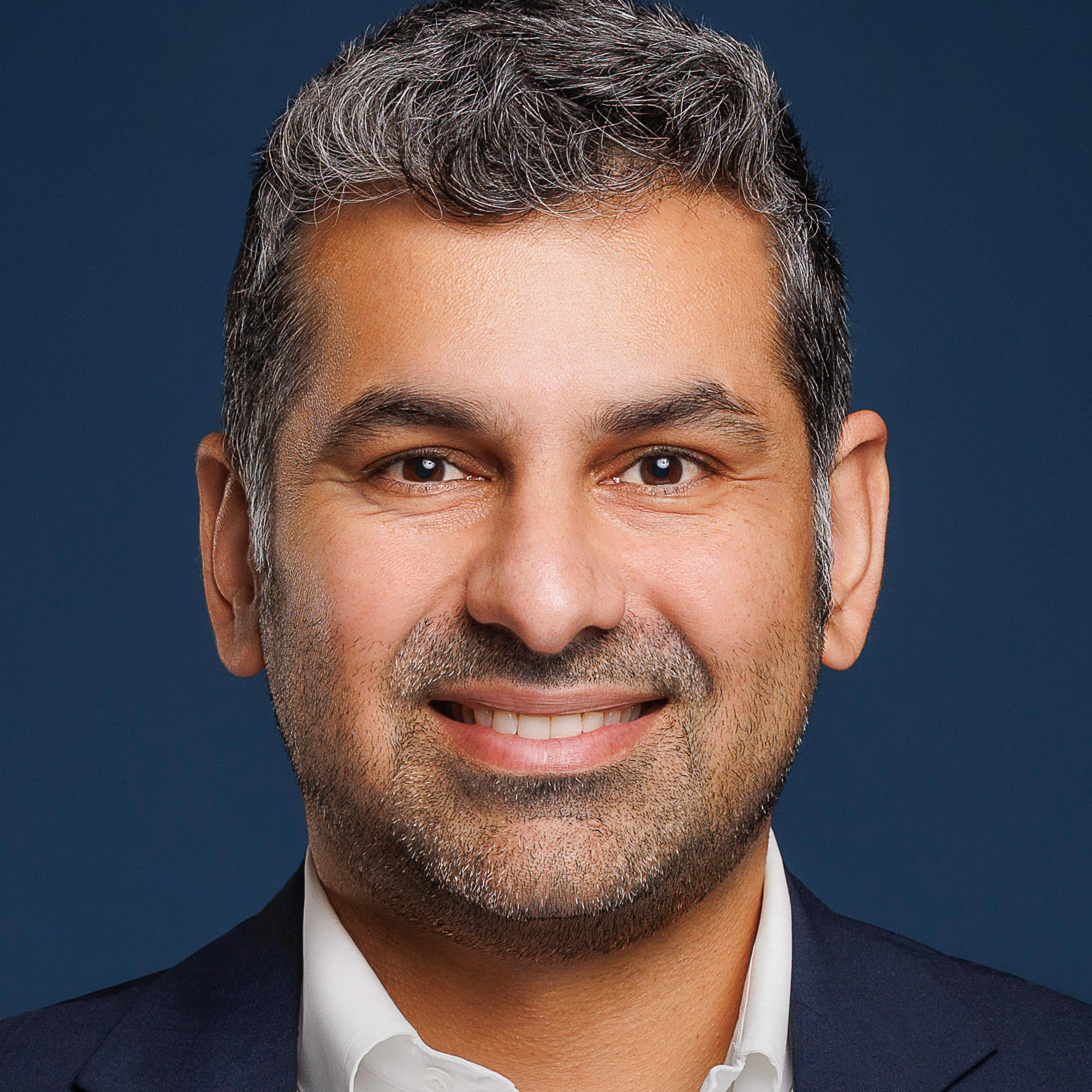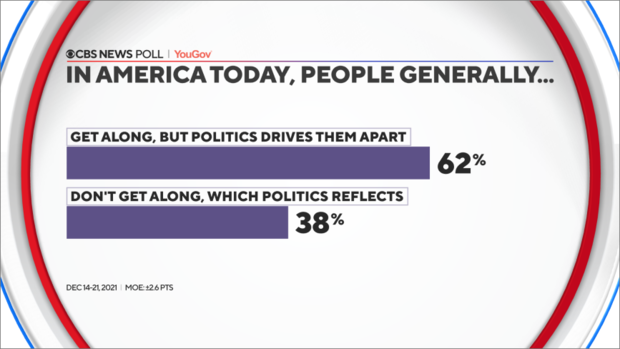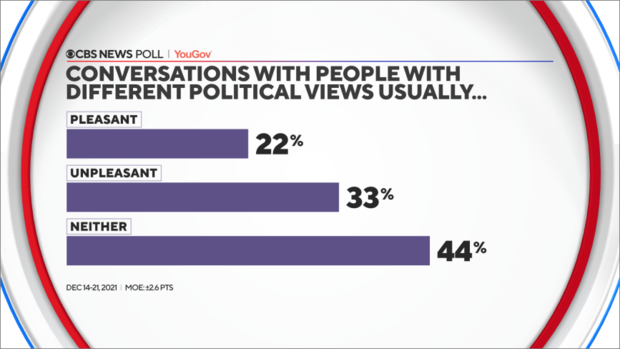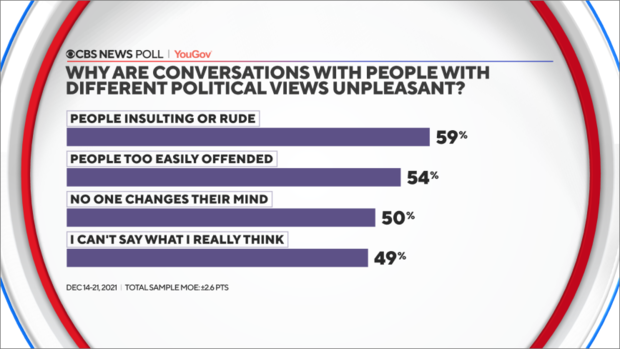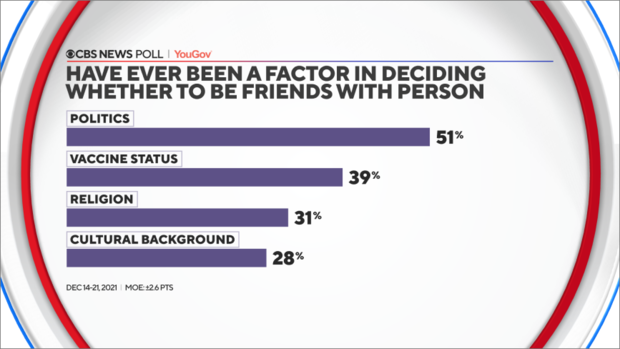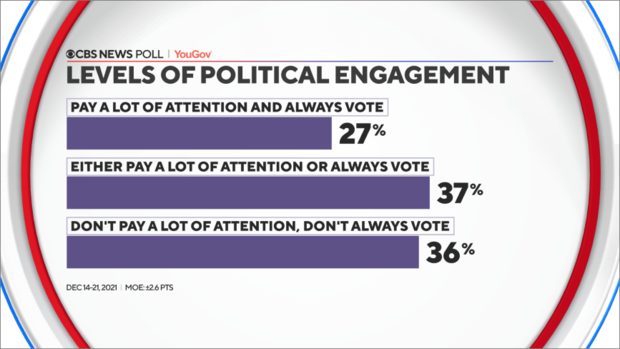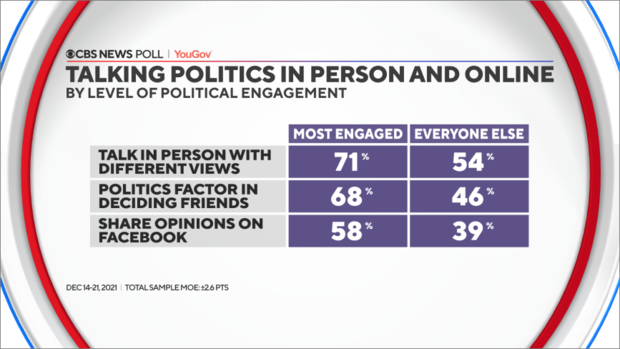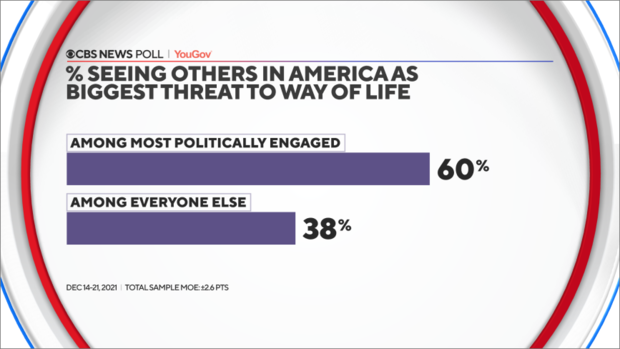Can we talk? Most feel Americans get along, but vocal minority more active, divided — CBS News poll
Social mores dictate that religion or politics are taboo topics in polite company, but hearing the other side is an important feature of a healthy society. With so many Americans feeling that democracy itself is under threat and fearing more political violence, talking and listening to each other becomes more critical. Are they willing to engage in dialogue?
Americans certainly come from diverse perspectives, but most feel people generally get along. They talk to people with whom they disagree politically, at least on occasion. And despite the potential for divisiveness in discussing politics, most don't feel their personal relationships have been damaged as a result.
That said, a vocal minority seem to dominate the conversation: those most interested and active in politics are talking more, experiencing more conflict, and are more divided themselves.
We asked people whether they think people generally get along but politics drives them apart, or whether politics just reflects people not getting along in the first place. That underlying view of what's causing our division can lead to a very different approach to politics — and to each other.
Across the political spectrum, at least six in 10 Americans feel that most people generally get along, but politics drives them apart. Moreover, most say the media overstates political divisions.
Talking with the other side
One reason people may feel politics divides us is the quality of the political conversations they're having. Most don't find talking politics with people of differing views to be very pleasant. They most often describe them neutrally, but are more likely to call them unpleasant than pleasant.
Independents are even less positive than partisans, calling these conversations unpleasant at twice the rate they characterize them as pleasant. And regardless of party identification, people who find them unpleasant also report having such conversations less frequently.
The third of Americans calling such conversations unpleasant give a variety of reasons — the main one being that people are insulting or rude. This is followed by feeling others are too easily offended — a sentiment particularly common among Republicans. Feeling that no one changes their mind and that you can't say what you really think were each selected by about half.
Few report having these conversations a lot, but they are more common in person than online, where it can be easier to find like-minded people and avoid those who differ. Six in 10 say they have these conversations in person — at least sometimes — while majorities across party lines say they almost never have such discussions online.
Politics and personal relationships
While most don't particularly enjoy political disagreements, just a third of Americans say any of their personal relationships have become tense as a result. Even fewer — one in five — say a relationship has been damaged so that it still suffers. About the same number report having a relationship that is broken to the point at which they no longer talk to someone.
Does politics determine whether to be friends with someone in the first place? Half of Americans say it's been at least a small factor in helping decide whether or not to be friends with someone, though just one in five call it a big factor. Still, politics ranks higher on being a factor than things like religion, cultural background, social class, and occupation.
Democrats are more likely to identify politics as a factor than Republicans and independents. A partisan gap also emerges on the politically charged issue of vaccine status, which about six in 10 Democrats but only one in five Republicans identify as a factor.
The most engaged vs. everyone else
While most Americans do not feel divided by politics, the truth is that most neither pay a lot of attention to the subject — only a third say they do — nor do they talk politics a lot. It's a smaller group of political junkies who are both active and talkative, and much more polarized by politics.
Take the 27% who say they both always vote and pay a lot of attention to politics. These are the political junkies who are energized by following news. They are just as likely to say politics over last year has motivated them to get more involved as wanting to tune out, unlike everyone else.
At the other end of the political engagement scale are people who neither pay a lot of attention to politics nor vote all the time. They are more likely to say people generally don't get along, and politics just reflects that and to report that they never talk politics with people they disagree with, either in person or online.
In addition to being more politically active, the most engaged group appears to let politics into their everyday lives more. This group is especially likely to identify politics as a factor in friendships, while other Americans — who make up the majority of the country — mostly say it's not a factor at all.
This group tends to be much more ideological and partisan: six in 10 identify as either a strong Democrat or Republican. They rate their own party favorably and the other party negatively on a five-point favorability scale. In fact, among Democrats, this group is twice as likely as the less politically engaged to give fellow Democrats a five-out-of-five rating and Republicans a one out of five — the worst possible rating.
At the same time, they are the most likely group to report talking politics with those of differing views. That includes both in-person and online discussion, with most saying they've posted their opinions on Facebook, and half saying they sometimes talk to people with different views online.
Perhaps it's not surprising then that this group is also more likely to report having relationships hurt by political disagreements. Three in 10 say some of their relationships have been damaged. The same number describe relationships as broken to the point of no longer talking. While it isn't most people, broken relationships are twice as common among this group as they are among most Americans.
Most ominously, this politically active, talkative group tends to view politics in existential terms. Six in 10 say the biggest threat to the American way of life now comes from others in America.
This CBS News/YouGov survey was conducted with a nationally representative sample of 2,092 U.S. adult residents interviewed between December 14-21, 2021. The sample was weighted according to gender, age, race, and education based on the U.S. Census American Community Survey and Current Population Survey, as well as to 2020 presidential vote. The margin of error is ±2.6 points.
